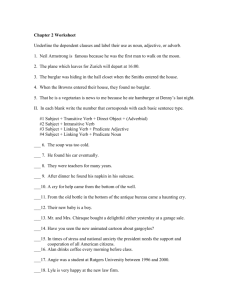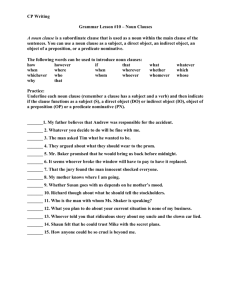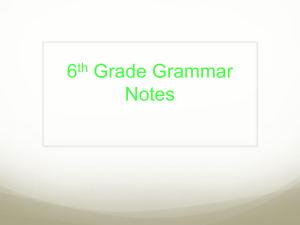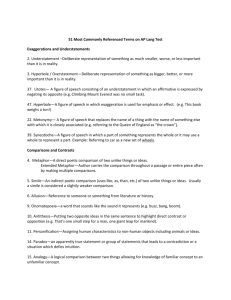Syntax Glossary
advertisement
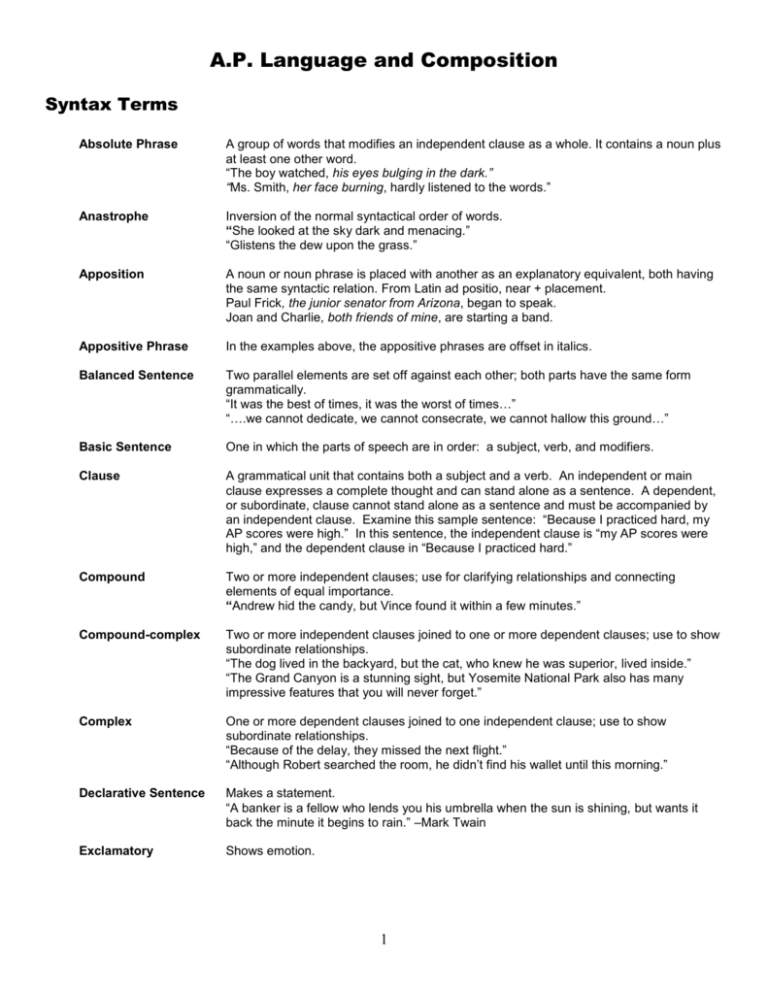
A.P. Language and Composition Syntax Terms Absolute Phrase A group of words that modifies an independent clause as a whole. It contains a noun plus at least one other word. “The boy watched, his eyes bulging in the dark.” “Ms. Smith, her face burning, hardly listened to the words.” Anastrophe Inversion of the normal syntactical order of words. “She looked at the sky dark and menacing.” “Glistens the dew upon the grass.” Apposition A noun or noun phrase is placed with another as an explanatory equivalent, both having the same syntactic relation. From Latin ad positio, near + placement. Paul Frick, the junior senator from Arizona, began to speak. Joan and Charlie, both friends of mine, are starting a band. Appositive Phrase In the examples above, the appositive phrases are offset in italics. Balanced Sentence Two parallel elements are set off against each other; both parts have the same form grammatically. “It was the best of times, it was the worst of times…” “….we cannot dedicate, we cannot consecrate, we cannot hallow this ground…” Basic Sentence One in which the parts of speech are in order: a subject, verb, and modifiers. Clause A grammatical unit that contains both a subject and a verb. An independent or main clause expresses a complete thought and can stand alone as a sentence. A dependent, or subordinate, clause cannot stand alone as a sentence and must be accompanied by an independent clause. Examine this sample sentence: “Because I practiced hard, my AP scores were high.” In this sentence, the independent clause is “my AP scores were high,” and the dependent clause in “Because I practiced hard.” Compound Two or more independent clauses; use for clarifying relationships and connecting elements of equal importance. “Andrew hid the candy, but Vince found it within a few minutes.” Compound-complex Two or more independent clauses joined to one or more dependent clauses; use to show subordinate relationships. “The dog lived in the backyard, but the cat, who knew he was superior, lived inside.” “The Grand Canyon is a stunning sight, but Yosemite National Park also has many impressive features that you will never forget.” Complex One or more dependent clauses joined to one independent clause; use to show subordinate relationships. “Because of the delay, they missed the next flight.” “Although Robert searched the room, he didn’t find his wallet until this morning.” Declarative Sentence Makes a statement. “A banker is a fellow who lends you his umbrella when the sun is shining, but wants it back the minute it begins to rain.” –Mark Twain Exclamatory Shows emotion. 1 Freight Train Sentence consisting of three or more very short independent clauses joined by conjunctions. Independent Clause A grammatically complete sentence. Imperative Sentence Gives a command. Interrogative Asks a question. Interrupted Sentence Non-essential information added in the middle of a sentence set off with dashes. Inversion Reversing the customary (subject first, then verb, then complement) order of elements in a sentence or phrase; it is used effectively in many cases, such as posing a question: “Are you going to the store?” Usually, the element that appears first is emphasized more than the subject. Isolated Standing alone; solitary. Juxtaposition To place side by side, especially for comparison or contrast. Listing Ordering in rank by number, importance, or size. Loose Sentence Modifiers throughout – main clause comes at the beginning of the sentence followed by subordinate phrases and clauses. “I found a large room, obviously a former library, filled with tables, and stacked with books.” Omission Leaving out. Oxymoron A rhetorical device in which contradictory terms are combined as in “deafening silence.” Parallelism Sentence elements in a series have all the same form and same grammatical function; main clause comes first. Parenthesis A comment departing from the theme of discourse; a digression (See interrupted sentence) Periodic Sentence The main clause of the sentence is found at the end. “Across the meadow, beyond the rushing creek, she saw her dog.” Phrase A group of related words that lacks either a subject, a predicate, or both. Predicate Adjectives One type of subject complement – an adjective, group of adjectives, or adjective clause that follows a linking verb. It is in the predicate of the sentence, and modifies or describes the subject. For example, in the sentence “My boyfriend is tall, dark, and handsome,” the group of predicate adjectives (“tall, dark, and handsome”) describes “boyfriend.” Predicate Nominative A second type of subject complement – a noun, group of nouns, or noun clause that renames the subject. It, like the predicate adjective, follows a linking verb and is located in the predicate of the sentence. For example, in the sentence “Abe Lincoln was a man of integrity,” as it renames Abe Lincoln. Occasionally, this term or the term predicate adjective appears in a multiple-choice question. Prepositional Phrase Group of words beginning with a preposition. “under the table,” “beside the white chickens” Simple Sentence One independent clause; use for emphasis and clarity. 2 Subject Complement The word (with any accompanying phrases) or clause that follows a linking verb and complements, or completes, the subject of the sentence by either (1) renaming it or (2) describing it. The former is technically called a predicate nominative, the latter a predicate adjective. This term is occasionally used in multiple-choice questions. Subordinate Clause A group of words that contains a subject and a predicate but is incomplete as a sentence. Syntactic Fluency Ability to create a variety of sentence structures, appropriately complex and/or simple and varied in length. Syntactic Permutation Sentence structures that are extraordinarily complex and involved. They are often difficult for a reader to follow. Syntax The grammatical structure of a sentence; the arrangement of words in a sentence. Syntax includes length of sentence, kinds of sentences (questions, exclamations, declarative sentences, rhetorical questions, simple, complex, or compound). Tricolon Sentence consisting of three parts of equal importance and length, usually three independent clauses. “They opened their gifts, exchanged their pleasantries, and ate their fill.” “I require three things in a man. He must be handsome, ruthless, and stupid.” –Dorothy Parker Verbal Phrase Verb forms used as a noun. 3



